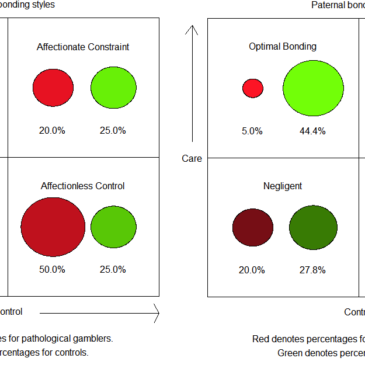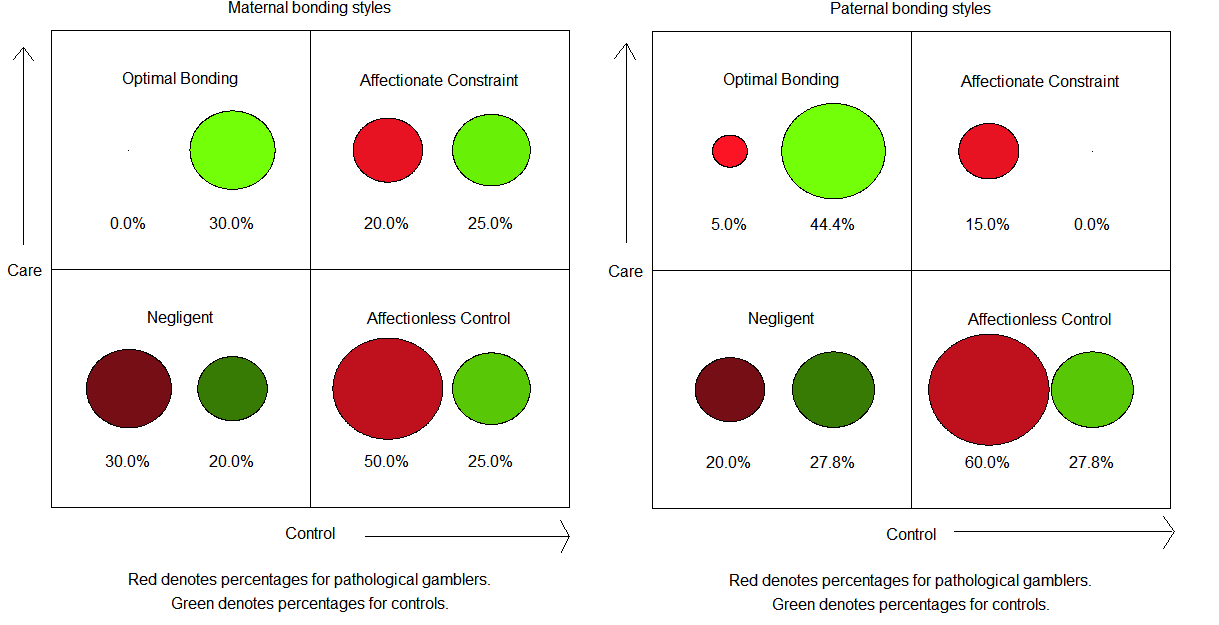Addiction often develops when someone who has a combination of antecedents, such as genetic, environmental, and psychological risk factors repeatedly interacts with an object of addiction, like gambling (Shaffer et al., 2004). One key antecedent of addiction might be the kind of bond children have with their parents. In this week’s WAGER, as part of our Special Series on Motherhood and Addiction, we summarize a recent study that examined the relationship between parental bonds during childhood and pathological gambling later in life (Villalta, Arévalo, Valdepérez, Pascual, & de los Cobos, 2015).
Methods
- Researchers used a retrospective case-control study design to examine the relationship between perceived parenting style and pathological gambling.
- The full sample included 40 male participants.
- Cases were adult male pathological gamblers with the presence of at least 1 parent before age 16 who were seeking help at the hospital’s outpatient addiction treatment unit.
- Controls were adult males from the same community as cases matched by age with no history of mental illness who were waiting in the lobbies in other areas of the hospital.
- Trained clinical psychologists interviewed participants to learn about:
- Pathological gambling, measured using the South Oaks Gambling Screen (SOGS) translated into Spanish; and
- Their bond with their parents, measured using the Parental Bonding Instrument (PBI).
- The PBI plots bonding styles on two dimensions: parental caring and parental control.
- The researchers used PBI scores to categorize parent-child bonds into one of 4 groups:
- Negligent Parenting – low care and low control
- Affectionless Control – low care and high control
- Affectionate Constraint – high care and high protection
- Optimal Bonding – high care and low control
Results
- The Figure show, healthy controls reported a variety of bonds with their parents, but the most frequent type was Optimal Bonding. This was true for both maternal (30%) and paternal (44.4%) bonds.
- The Figure displays a very different pattern for pathological gamblers. Pathological gamblers were unlikely to report having Optimal Bonds with their mothers (0%) or their fathers (5%).
- Pathological gamblers were most likely to report having an Affectionless Control bond with both their mothers (50%) and their fathers (60%).
Figure. Percent of participants with each type of parent-child bond. Modified from Villalta et al. 2014. Click image to enlarge.
Limitations
- The study relies on the self-report of perceived parenting style. Parents’ actual parenting styles might differ from what participants perceived.
- The results might not be generalizable to all pathological gamblers because of the small sample size and because the researchers relied upon pathological gamblers from an outpatient treatment facility. Caution should be taken when attempting to interpret these results with the broader population of pathological gamblers because most never seek professional help (Slutske, 2006).
Conclusion
These findings support previous work examining parenting style as either a protective or risk factor for later substance use disorders. Adults with gambling disorder felt that their parents showed little care for them while being overprotective. Longitudinal research, which tracks participants over time, will help us understand the role parent-child relationships play in the pathway to addiction. If this finding turns out to be consistent and robust, it highlights a possible early intervention to help prevent expressions of addiction from occurring.
— John Kleschinsky
What do you think? Please use the comment link below to provide feedback on this article.
References
Shaffer, H. J., LaPlante, D. A., LaBrie, R. A., Kidman, R. C., Donato, A. N., & Stanton, M. V. (2004). Toward a syndrome model of addiction: multiple expressions, common etiology. Harvard Review of Psychiatry, 12(6), 367-374.
Slutske, Wendy S. (2006). Natural recovery and treatment-seeking in pathological gambling: Results of two U.S. national surveys. American Journal of Psychiatry, 163(2), 297-302.
Villalta, L., Arévalo, R., Valdepérez, A., Pascual, J. C, & de los Cobos, J. P. (2015). Parental bonding in subjects with Pathological Gambling Disorder compared with healthy controls. Psychiatric Quarterly, 86(1), 61-67.





